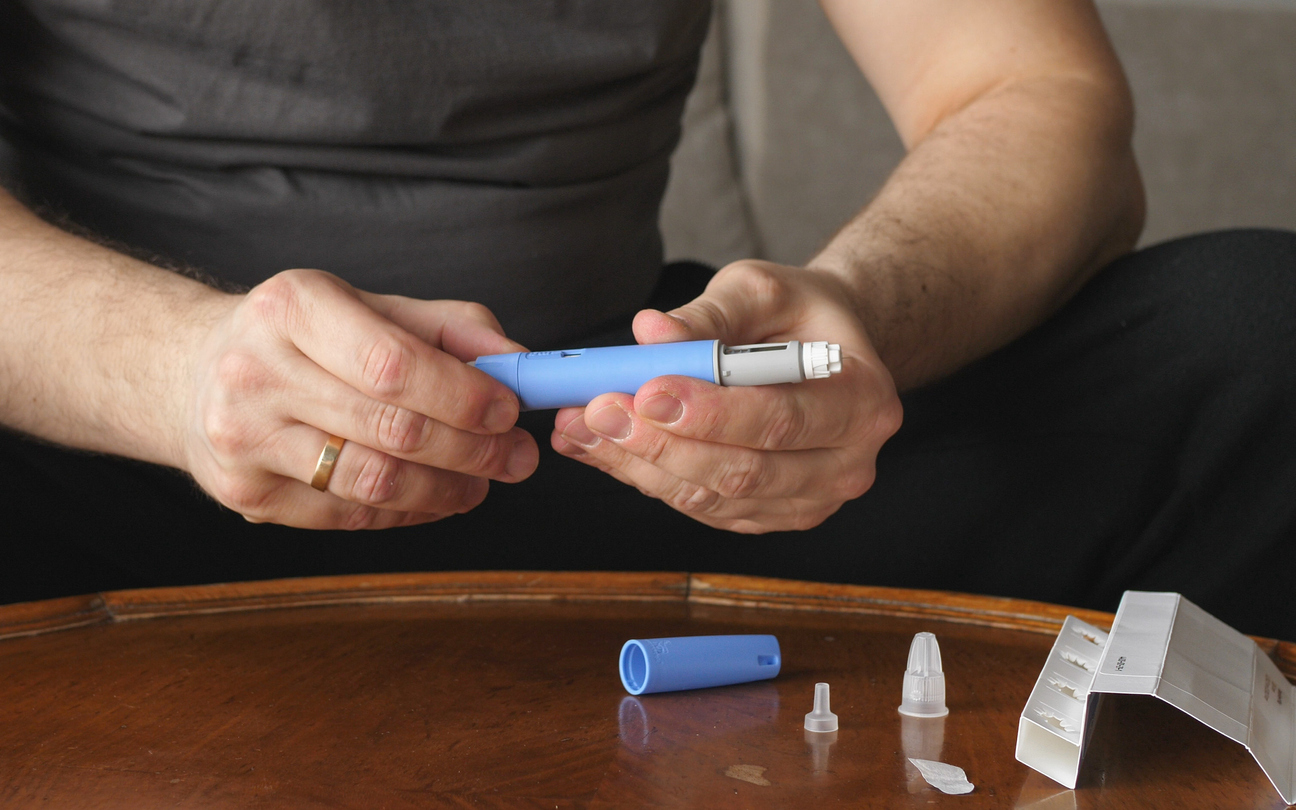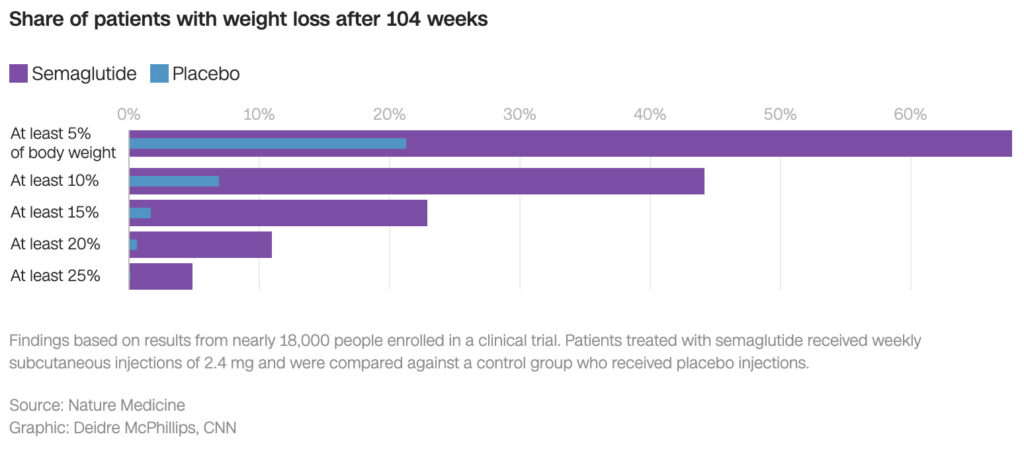
Some of the links on this page may link to our affiliates. Learn more about our ad policies.
Wegovy, Ozempic & Rybelsus…and now Zepbound
Everything You Need to Know About Semaglutide

Chronic obesity is an epidemic in the United States, with nearly 42% of adults affected in 2023. Scientists have come to realize that, for some, genetics and body composition play a major role in someone’s inability to lose weight. These findings have led doctors and researchers to determine that trouble losing weight can be a medical condition – just like high blood pressure, heart disease, or diabetes. With chronic obesity, your body establishes a ‘set point’ for weight that can be nearly impossible to break with just diet and exercise. This is where medically-assisted weight loss can help break through that unhealthy weight and help establish a new, healthier, set point for body weight. These findings have led to the advancement of medications to treat chronic obesity.
THE OBESITY EPIDEMIC
In 2003, the obesity rate among adults was approximately 32.2%, while in 2023, it had risen to around 41.9%. This is an increase of about 30% over a twenty-year period. By the year 2030, it’s predicted that nearly half of all Americans will be obese.
Wegovy, Ozempic, Rybelsus and Zepbound have all been shown to provide dramatic weight loss. The active ingredient in Wegovy, Ozempic, and Rybelsus is semaglutide or tirzepatide, which mimics a hormone in your body that tells the brain you’re full. Zepbound is tirzepatide specifically. They all work by slowing down the emptying of your stomach and decreasing your appetite – making you eat less and not feel as hungry.
All three medications are also made by the same company – Novo Nordisk, whereas Zepbound is made by Eli Lilly. Wegovy was approved in 2021 specifically for those who are obese or overweight with weight-related health problems.
Ozempic was approved by the Food and Drug Administration (FDA) in 2017 for people with type 2 diabetes. It is not approved for weight loss but is often prescribed off-label for that purpose. Rybelsus gained approval in 2019, and much like Ozempic, is only approved for the treatment of type 2 diabetes but can be prescribed off-label for weight loss. Zepbound was approved in November 2023 for weight loss.
Find What You Need
How Can I Get Wegovy, Ozempic, Rybelsus or Zepbound?
Ozempic, Rybelsus, and Wegovy are all prescription medications. You can obtain a prescription through your doctor. You’ll need to make an appointment with your primary care physician to see if you qualify. There are also many online medical weight loss programs that prescribe these medications. Calibrate, Enara Health, Fella Health, Form Health, Found, and Options Medical Weight Loss are some of the companies that prescribe their active ingredient Semaglutide to their online clients. There are also numerous local weight loss clinics around the USA that are starting to offer generic Semaglutide.
In April 2024, the FDA cleared the way for Wegovy to also help reduce the risk of heart attacks and stroke in people with cardiovascular disease who are overweight or obese. This is a significant change and allows Wegovy to be covered by Medicare Part D.
Similarly, Zepbound is prescribed through your healthcare provider if deemed necessary. Zepbound is likely available through specialty pharmacies, but you may need to coordinate with your insurance for approval. It is also available through medical weight loss programs such as Found.
Who Should Qualify For Wegovy, Ozempic, Rybelsus, or Zepbound?
Semaglutide is obviously appealing for anyone who wants to shed some weight, but they’re not approved for everyone. If you’re interested and think you would qualify, you should talk to your doctor first. In general, these medications require that you have a body mass index reading of 30 or higher.
Wegovy
Wegovy has been approved as a treatment for weight loss for adults and children 12 years and older who are considered obese, have excessive weight, or are experiencing weight-related health problems.
To be eligible, you have to have a body mass index (BMI) of 30 or more or a BMI of 27 or more and have other health problems like diabetes, high blood pressure, or high cholesterol that losing weight can help improve. You will find people who don’t fall into these categories who have still been prescribed Wegovy.
Ozempic
Ozempic is only approved for adults with type 2 diabetes. It can’t be used by people with type 1 diabetes and it’s also not known if Ozempic is safe for people who have pancreatitis or for children under the age of 18. The medication has been prescribed off-brand to people wanting to lose weight, but it isn’t approved for weight loss.
Rybelsus
Rybelsus is only approved for adults over the age of 18 with type 2 diabetes. It can be taken as a first-time diabetes medication and has been prescribed off-label for weight loss.
Zepbound
Again, the main ingredient in Zepbound is tirzepatide, another FDA-approved weight loss drug similar to semaglutide. Zepbound can be prescribed by your physician or through a medically supervised weight loss program such as Found. Unlike some of the other drugs which are used ‘off label‘ for weight loss, Zepbound is specifically cleared for weight loss.
To clarify, it is approved for adults with obesity which is classified by having a body mass index of 30 kilograms per square meter (kg/ m2) or greater, overweight (body mass index of 27 kg/m2 or greater), or has at least one weight-related condition (such as high blood pressure, type 2 diabetes or high cholesterol).
Body Mass Index Calculator
What Kind of Results Will You See with Semaglutide?
The results from taking these medications are usually quick and dramatic. You will typically be able to tell you’ve lost weight in the first two to four weeks of taking semaglutide. You will lose, on average, between 5-10% of your body weight with Ozempic or Wegovy. In clinical trials, participants who took semaglutide lost an average of 15-20% of their body weight over a period of 68 weeks. This weight loss was sustained over time, with participants maintaining an average weight loss of 17-18% at 2 years.
Moreover, a 2024 analysis of a 4-year long study called the Select trial looked at the long-term effects of Wegovy. It followed 17,600 people from 41 countries between 2018 and 2021, and consistent with previous research, found that people lost about 10% of their body weight on average compared to a placebo group, which plateaued after about 65 weeks.
In the first 2 – 4 weeks of taking Semaglutide, you may lose, on average, between 5% and 10% of your body weight with Ozempic or Wegovy
It’s important that you incorporate an exercise routine and a healthy dietary plan. Experts recommend that you eat between 1200 and 1800 calories a day depending on your initial weight. You should incorporate plenty of different vegetables and healthy, lean proteins in your diet.
Be aware that some say the weight loss is so rapid and substantial it can alter your face shape. It’s a phenomenon referred to as Ozempic face and can result in a sagging, gaunt look. When we carry a higher weight for a long time, and then lose a large amount of that weight it can lead to excess skin accumulation in the abdomen, arms, and face. That skin can be wrinkled and loose and cause some people to look older. It’s not a phenomenon that happens with everyone and experts recommend fillers or collagen supplements to help.
Is Semaglutide Safe?
Ozempic, Rybelsus and Wegovy have undergone the same rigorous government-approval process as any other medication on the market. As mentioned above, all have received FDA approval for the treatment of diabetes or weight loss.
But since they are all relatively new to the market, there isn’t enough data available to determine what, if any, long-term side effects there may be. Researchers caution that these medications should not be taken by women who are pregnant, nursing, or considering pregnancy.
What are the Side Effects of Semaglutide?
As with most prescription medications, there are side effects. With semaglutide, they can be rather unpleasant. Your doctor will usually start you on a low dose and gradually increase it to lessen the side effects, but you may still experience them, especially gastrointestinal ones.
Common Semaglutide side effects include:
- Nausea
- Vomiting
- Diarrhea
- Stomach (abdominal) pain
- Constipation
- Decreased appetite
Serious side effects of Semaglutide can include:
- Pancreatitis (inflammation of the pancreas)
- Kidney problems, including kidney failure
- Gallbladder problems, such as gallstones
- Increased risk of low blood sugar (hypoglycemia) when used with other diabetes medications
- Possible increased risk of certain types of thyroid tumors, including thyroid cancer
- Serious allergic reactions
All three do come with a warning indicating a risk for thyroid cancer. Semaglutide has caused thyroid tumors in lab mice and rats. And while animal studies don’t necessarily indicate what’s possible in humans, it is important to know before you begin taking Wegovy, Ozempic or Rybelsus.
To date, there haven’t been any cases of thyroid cancer reported by people who take Ozempic, Rybelsus, or Wegovy. But it’s really not known if taking semaglutide increases your risk. That’s why a doctor likely won’t prescribe these medications to you if you or a family member has had medullary thyroid carcinoma (MTC) or multiple endocrine neoplasia syndrome type 2 (MEN2).
Moreover, the Select trials confirmed these typical side effects as a reason for why many stop taking the drug, including nausea, diarrhea, vomiting and constipation. No new significant side effects were found, and may experienced these symptoms early on within a few months of the trial.
Wegovy Side Effects
The most common side effects of Wegovy are nausea, vomiting, constipation or diarrhea, stomach pain or an upset stomach, heartburn, dizziness, headache, belching, gas, feeling bloated, a runny nose or sore throat, and the stomach flu. More serious side effects include the risk of thyroid cancer, gallstones, inflammation of the pancreas, and low blood sugar.
Ozempic Side Effects
The most common side effects of Ozempic are diarrhea or constipation, nausea, vomiting, and stomach pain.
Less common, but more serious side effects include inflammation of your pancreas, low blood sugar, kidney or gallbladder problems, or a serious allergic reaction. During clinical trials, a small number of participants developed new or worsening retinopathy. That’s a complication of diabetes that causes damage to blood vessels in the eyes and can result in vision loss or blindness. If you already suffer from retinopathy, you should talk to your doctor before starting Ozempic.
Rybelsus Side Effects
The most common side effects of Rybelsus are diarrhea or constipation, stomach pain, vomiting, nausea, and decreased appetite. They will most likely occur when you start the medication or increase your dosage. In clinical trials, side effects were most likely experienced by those who took a higher dose of 14mg.
More severe side effects of Rybelsus can include low blood sugar, kidney or pancreas problems, and allergic reactions like skin rashes or hives.
Side effects with all three of these medications can subside once your body gets used to taking Semaglutide. Some people may experience no side effects at all. Others may have them for a couple of months, while some may experience side effects the entire time they’re taking the medication.
Tirzepatide and Zepbound Side Effects
Again the main ingredient in Zepbound in tirzepatide. According to the recent report by the U.S. Food and Drug Administration (FDA), “Zepbound can cause side effects such as nausea, diarrhea, vomiting, constipation, abdominal (stomach) discomfort and pain, injection site reactions, fatigue, hypersensitivity (allergic) reactions (typically fever and rash), burping, hair loss and gastroesophageal reflux disease.”
When tested in rats, Zepbound caused thyroid C-cell tumors, but is unknown and untested if this occurs in humans. Those with a family history of medullary thyroid cancer or have Multiple Endocrine Neoplasia syndrome type 2 should avoid taking Zepbound.
A full list of side effects for tirzepatide can be found here.
What is the Cost of Wegovy, Ozempic, and Rybelsus? Zepbound?
Ozempic and Rybelsus generally run between $900 and $1000 a month without insurance. Wegovy generally runs between $1300 and $1600 a month without insurance.
Wegovy offers a manufacturer discount card to those who qualify. The card may reduce your copay to $25 a month for six months and it can be used at a participating retail pharmacy. The maximum savings is $200 a month.
The discount card is only available to U.S. residents who are commercially insured by a plan that offers coverage of Wegovy. If you have Medicaid, Medicare, Tricare or insurance through the VA, you will not be eligible for the discount card.
Ozempic also offers a savings card. The company says you can pay as little as $25 for a one-month, two-month or three-month supply for up to 24 months. Just like Wegovy, you have to be commercially insured with a plan that offers coverage for Ozempic.
Rybelsus offers what it calls a SingleCare card to receive the medication at a discounted price. It also offers a patient financial assistance plan for those who qualify.
Cost of Zepbound
Zepbound is also quite expensive. If you’re uninsured or if your insurance doesn’t cover the medication, you will most likely be paying between $1,000-1,200 a month for the medication.
If your insurance does cover Zepbound but still requires that you pay for a percentage of the medication, you may be able to access the medication for as low as $25 out of pocket.
Alternatively, if you have commercial drug insurance coverage for Zepbound, you could pay as little as $25 a month with maximum card savings of up to $150 per 1-month prescription or separate maximum annual savings of up to $1,800 per calendar year. Be aware that this differs if you have commercial drug insurance that does not cover Zepbound. Find more information here.
Do Wegovy or Ozempic Injections Hurt? What about Zepbound?
Wegovy and Ozempic have to be administered through injection. Rybelsus is an oral medication. Any time you are sticking something into your skin, you’re going to feel it and it may sting some. But the needles are small and shouldn’t hurt too much. Rather than injecting into the muscle, these injections go just below the skin making them less painful than other injections.
Before giving yourself an injection, clean the site with alcohol and pick a different spot every week to avoid skin toughness or sensitivity.
Wegovy
Wegovy is a once-a-week injection that can be administered in the abdomen, thigh, or upper arm at any time during the day, as long as you give it to yourself on the same day each week.
It’s understandable that some people aren’t comfortable giving themselves a shot. You can sign up for Wegovy’s WeGo Together program and one of the company’s coaches can walk you through the injection process.
Ozempic
Like Wegovy, Ozempic is a once-a-week injection. The shot goes into your stomach, thigh, or upper arm. Be sure not to inject Ozempic into a muscle or vein. The needle is small and shouldn’t hurt. But you may experience swelling, redness, or itching at the injection site.
Rybelsus
Rybelsus is a daily oral medication. It’s most effective when it’s taken in the morning 30 minutes before you eat or drink anything or take any other oral medications. You should take it with four ounces or less of plain water. If you wait less than 30 minutes or take it with food or other beverages, it will lessen the effect of Rybelsus.
Zepbound
Similarly to Wegovy and Ozempic, Zepbound is a once-weekly injection that is not typically painful but may be uncomfortable until you get used to them. Zepbound can be injected into the skin of your belly, thigh, or upper arm depending on your preference. Like the others, Zepbound uses a subcutaneous injection that just goes under your skin with a small needle.
Will I Gain the Weight Back if I Stop Taking Wegovy, Ozempic or Rybelsus?
Following 2024 analysis of the 4-year Select trial, it was found that the average weight loss people experienced from using Wegovy of 10% was sustained for up to 208 weeks, which equivalates to about four years. However, it is important to understand that those who sustained the weight loss were the patients that continued the medication.
So, the simple answer is yes – you will gain the weight back if you stop taking these medications. And it will come back quickly. Many people report gaining more weight than they lost. That’s why it’s important to make lifestyle changes when you begin taking Semaglutide. You’ll still need to adjust your diet to make sure what you’re eating is good for you. Cutback or cutout desserts, sugar-sweetened drinks, and fatty foods. And make sure you begin or continue to exercise.
Obesity, like diabetes, is considered a chronic condition. So, the need for medication to help control it can be lifelong. Just like any other medication you may take for a medical condition, you will need to continue taking Wegovy, Ozempic, or Rybelsus to maintain your weight loss.
Again, it’s important to note that Ozempic is only approved as a treatment for diabetes. But is often taken off-label for weight loss. The manufacturer says it does not promote, encourage or suggest that Ozempic be used for weight loss and has not studied what kind of weight changes you may experience after taking it.
What About Zepbound?
The same goes for Zepbound. According to a study conducted by Aronne et. al. (2023), “in participants with obesity/overweight, withdrawing tirzepatide led to substantial regain of lost weight, whereas continued treatment maintained and augmented initial weight reduction.”
Another study led by the manufacturers, Eli Lilly, found that those who continued taking tirzepatide lost 21% of their body weight across 36 weeks on average. When they measured those who stopped taking the medicine and switched to a placebo, they gained 14% of their weight back.
So, the same suggestions go for Zepbound, a combination with diet and exercise is key to managing and maintaining its effects.
Is Semaglutide a First-Line Option for Weight Loss?
Metformin is generally the first drug given to someone newly diagnosed with type 2 diabetes and is often recommended for weight loss by companies including Found. But the effectiveness of Ozempic and Wegovy make it a strong choice for an adult who has recently been told they have diabetes and need medication.
Wegovy is generally prescribed for those who need help with chronic weight management. All three medications are prescribed on a case-by-case basis, so, if you’re interested in taking them, you should talk to your doctor first and decide together what’s best for you.
Can I Use Wegovy, Ozempic, Rybelsus, or Zepbound Long-Term?
Type 2 diabetes is a long-term and chronic condition that needs continual management. Both Ozempic and Rybelsus have gone through the same rigid FDA approval process as any other medicine on the market. And while the company says there are no long-term side effects, Ozempic and Rybelsus are both still relatively new and it’s hard to know that for sure. Long-term effects of Wegovy are also still being researched.
For Zepbound, how long you it probably depends on your health goals which should be worked out with your prescriber. Zepbound is intended for long-term use, and while research has shown that people maintain weight loss with continued use, long-term effects are also unknown.
Wegovy Beyond Weight Loss
Outside of being beneficial for initial weight loss and sustained weight loss, Wegovy has been found to be protective for heart health. Results from the Select trial suggest that Wegovy has significant cardiovascular benefits, and found a 20% reduction in heart risk. However, this was determined not to be related to weight loss alone as heart benefits were found in even those who didn’t lose weight. Rather, it is thought to work by reducing inflammation to mitigate heart attacks or stroke. Individuals are now making a push for it to be covered under insurance for its health benefits.
Can I Stop Taking Wegovy, Ozempic, Rybelsus, or Zepbound Abruptly?
If you decide you no longer want to take Ozempic, Rybelsus, or Wegovy you can just stop at any time. They are not medications you have to be weaned off of. But before you stop, you should talk to your doctor first about the risks of regaining weight or having trouble managing your diabetes. Same is said to go for Zepbound.
Semagulutide and Blood Pressure
Recent research has looked further into the effects of semaglutide treatment on blood pressure. For instance, a Kennedy et. al. (2023) conducted a study in patients without diabetes and found “high-quality evidence to suggest that semaglutide results in a clinically significant reduction in BP [Blood Pressure] in these trial cohorts”. While more research is needed, it has now been suggested that this treatment could be beneficial to people with obesity and difficult-to-control blood pressure may particularly benefit from a weight-centric approach to hypertension treatment.
Does Semaglutide Make Your Hair Fall Out?
Hair loss is not listed as a side effect of Ozempic or Ryebelsus, but the makers of Wegovy did say in clinical trials three percent of people who received the injections reported having hair loss. And you will find social media posts from people taking the medications saying they’ve lost hair by the handfuls.
Experts don’t think Semaglutide is what is causing the hair loss, but a temporary condition known as telogen effluvium. It causes your hair to leave the growing stage too early and enter the resting stage, which is when hair is shed. And it’s a common condition for people after they experience severe stress or a dramatic body change. Pregnancy, divorce, major surgery, and quick and significant weight loss can all trigger telogen effluvium.
We generally lose up to 100 strands of hair every day. But a person experiencing telogen effluvium can lose up to 300 strands of hair a day. The hair usually starts thinning around the top of your head, and can, in some cases, affect your eyebrows and other body hair. But you won’t go bald.
The good news is the condition is temporary and will resolve itself, allowing the hair to grow back in three to six months. To help prevent the possibility of telogen effluvium while taking these medications, make sure you eat extra protein, take vitamins (especially A, B, C, D, E, biotin, iron, and zinc), and get the recommended amount of sleep each night.
Will Semaglutide or Tirzapetide Affect My Sleep?
Insomnia is not considered to be a side effect of Ozempic, Rybelsus, or Wegovy. No one who participated in any of the clinical trials reported having trouble sleeping. But some participants in clinical trials for Ozempic did report fatigue. It’s a small number – less than half a percent. But you should be aware there is a possibility of experiencing tiredness more often in the first few weeks of taking Ozempic.
For tirzepatide, sleep disturbances are also not a common side effect but again individual reactions to medications can vary. Some people might experience changes in their sleep patterns due to indirect effects like gastrointestinal discomfort or nausea, which are the more common side effects of tirzepatide.
What Other Supplements Should I Take?
When taking these medications, you should focus on eating a balanced and healthy diet to help you feel your best. It will also help you keep the weight off if, and when, you come off the medications.
The side effects can be different for everyone and each person has to find the supplements, vitamins, or minerals that help them counter those issues. You will find dozens of videos and posts on social media about what someone has found to help them. It may end up being trial and error for you or you may find you don’t need any extra supplements at all.
It is known that some supplements will help lessen the side effects when you’re taking Ozempic, Rybelsus, and Wegovy. Vitamin B12 has been shown to help ease some of the gastrointestinal side effects, as well as fatigue.
If you experience constipation, you may need to take semi-regular doses of Metamucil or Miralax. For gas or burping, try an over-the-counter antacid or something like Tums.
What Supplements Should I Avoid?
As with all medications, there may be certain supplements you should avoid because of the way they’ll interact with each other.
Some people with type 2 diabetes take chromium supplements to lower glucose levels and improve insulin resistance. Others may use them to build muscle or help with weight loss. Using chromium while taking Ozempic may increase your risk of low blood sugar. The following supplements also have a negative interaction with Ozempic:
- Banaba
- Bitter Melon
- Gymnema
- Prickly Pear Cactus
- White Mulberry
There are no known supplement interactions with Wegovy or Rybelsus, but Quinolones (bactericidal antibiotics) and Hydroxychloroquine can cause moderate reactions. Gatifloxacin and Gymnema can lead to serious interactions.
Before taking Wegovy, Ozempic, or Rybelsus, it’s important to let your doctor know everything you take whether it’s a prescription or over-the-counter drug or supplement. Your doctor can help determine if there might be any interactions with medications, vitamins or minerals you take.
How Likely Is Insurance to Cover Wegovy, Ozempic, Rybelsus, or Zepbound?
Whether your insurance will cover these medications depends on what type of insurance you have.
Ozempic Insurance Coverage
- Employer-Provided Insurance – Coverage for Ozempic is based on the plan you have.
- Individual/Family Coverage Through the Affordable Care Act – Coverage for Ozempic varies. You will have to check with your particular plan to find out.
- Medicare – Most Medicare plans cover Ozempic, depending on whether you’ve met your deductible.
- Medicaid – Most Medicaid plans cover Ozempic, depending on whether you’ve met your deductible.
- Tricare (Military) Insurance – Tricare covers Ozempic on a case-by-case basis. You’ll need prior approval to receive the drug and non-active duty members will have to pay a certain amount to get it.
- VA Health Benefits – You will have to fill out a form to see if you qualify for Ozempic coverage through the VA
Rybelsus Insurance Coverage
- Employer-Provided Insurance – Coverage for Rybelsus is based on the plan you have. Check with your provider to find out if Rybelsus is covered.
- Individual/Family Coverage Through the Affordable Care Act – Coverage for Rybelsus varies. You will have to check with your particular plan to find out.
- Medicare – Most Medicare plans cover Rybelsus, depending on whether you’ve met your deductible.
- Medicaid – Most Medicaid plans cover Rybelsus, depending on whether you’ve met your deductible.
- Tricare (Military) Insurance – Tricare covers Rybelsus on a case-by-case basis. You’ll need prior approval to receive the drug and non-active duty members will have to pay a certain amount to get it.
- VA Health Benefits – You will have to fill out a form to see if you qualify for Rybelsus coverage through the VA.
Wegovy Insurance Coverage
- Employer-Provided Insurance – Coverage for Wegovy varies based on the plan you have. If your insurance does not cover it, you may be able to work with your doctor and write an appeal letter to request coverage.
- Individual/Family Coverage Through the Affordable Care Act – Coverage for Wegovy through ACA varies. Marketplace plans aren’t required to offer coverage for obesity medication, but some may offer it. You will have to check with your particular plan to find out what’s available to you.
- Medicaid – If you have Medicaid, coverage for Wegovy will depend on the state where you live. You’ll have to check with your state Medicaid office to find out.
- Medicare – Medicare Part D does provide coverage for Wegovy. However, it is not super wide spread quite yet, so broader coverage in 2025 could be more likely.
- Tricare (Military) Insurance – Certain Tricare Prime and Tricare Select plans may offer coverage if Wegovy is determined to be a medically necessary treatment for obesity.
- VA Health Benefits – If you have benefits through the VA and participate in the MOVE! Program, you may be eligible for coverage.
Zepbound Insurance Coverage
For Zepbound, it is commonly covered if it’s “prescribed for another medical condition, such as diabetes, but not if they’re being used specifically for weight loss”. Here are some other methods of Zepbound coverage according to GoodRx:
Medicaid coverage for Zepbound varies by location. Use the Eli Lilly directory to find out about coverage. If not, you can talk to your healthcare provider about submitting an appeal.
Medicare – Medicare plans don’t cover weight-loss medications but be aware that some retiree health insurance plans may cover them.
U.S. Department of Veterans Affairs (VA) – VA health care may cover weight-loss medications and management. You should talk to your provider about your benefits options if you have coverage through the VA.
Tricare – Tricare insurance plans may cover Zepbound but your provider might be required to submit a coverage review (like a prior authorization). Talk to your provider or military treatment facility for options.
Government employee benefits – Coverage varies based on the city, state, local municipality, or federal department you work for.
Content on this site is for reference and information purposes only. Do not rely solely on this content, as it is not a substitute for advice from a licensed healthcare professional. Aging.com assumes no liability for inaccuracies. Always read labels and directions before using a product or prescription.




